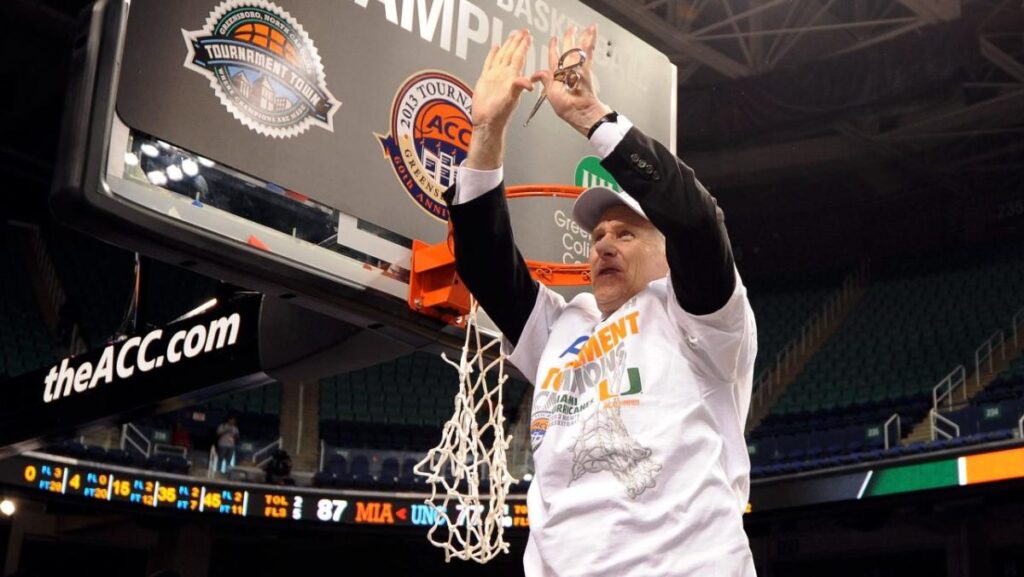
Jim Larrañaga could get by — and repeatedly thrive — in the old college sports system, where athletes could only be paid under the table, even if that meant the federal government could subpoena his text messages. But the 75-year-old head men’s basketball coach at the University of Miami acknowledged this week that he doesn’t have what it takes — at least not at this point in his career — to compete for talent in the growing free market.
This, despite the fact that Larrañaga’s 2022-23 national semifinalist team, led by Kansas State transfer Nijel Pack, has become one of the first archetypes of the new era of the financed NIL booster.
More from Sportico.com
In a surprise announcement Thursday, Larrañaga said he would immediately step down as coach of the Hurricanes, just two seasons after leading the program to its first Final Four. His current contract, extended in May 2023, runs until the end of next academic year. Miami is currently 4-8 this season after winning its first three games.
As a private university, Miami is not required to disclose its employees’ contracts. However, in the school’s 2023 tax return, which is public, it appears that Larrañaga earned $2.85 million in annual compensation.
“I’m exhausted,” Larrañaga told reporters at a news conference. “I tried everything possible to keep it going. And I know I’m going to be asked a lot of questions, but I want to answer them before they even ask me.
He said he was “shocked…beyond belief” when, following the team’s historic Final Four appearance 20 months ago, eight of his players decided to enter name on the transfer portal.
Larrañaga lamented: “The possibility of making money elsewhere has created a situation in which you have to start asking yourself as a coach: what is this all about?”
Larrañaga’s grief echoes that of several other prominent college basketball coaches, including Duke’s Mike Krzyzewski, North Carolina’s Roy Williams, Virginia’s Tony Bennett and Syracuse’s Jim Boeheim, who retired at in the four years since NCAA rule changes now allow college athletes to sell their NIL. Boeheim, incidentally, publicly accused Miami of “buying” his Final Four team with NIL money.
Larrañaga should arguably be perfectly placed to explain the forces of capitalism that motivate its players to look for more money elsewhere. In 2011, at the age of 61, Larrañaga left his longtime head coaching position at George Mason – which he had led to its only Final Four five years earlier – to take the reins of the UofM. Before that, he had rejected other offers, including those from Providence, citing his comfort and familiarity with Northern Virginia, where he had coached the Patriots since 1997.
The change of scenery quickly proves fruitful. In his second season, the Hurricanes won the ACC regular season title and advanced to the Sweet 16 of the NCAA men’s tournament.
But Coral Gables would also see dark days.
In 2017, Larrañaga received a grand jury subpoena as part of the Justice Department’s college basketball corruption investigation, and he later admitted to cooperating with authorities. Larrañaga was never accused of wrongdoing by the government, but in court filings that identified him as “Coach-3,” he was allegedly mentioned in a wiretapped phone call between two of the defendants as soliciting the help from Adidas to facilitate a $150,000 payment to a rookie Miami hoped to sign. Larrañaga has denied allegations that he or his assistants were involved in bribes paid to athletes.
“It has been a physical, mental, emotional and spiritual strain,” he said at the time, according to the Associated Press. “But it’s something that’s there. I have to take care of it. And I have the support of my wife and a wonderful family. I have the support of the university and the support of my staff and my players. We must therefore continue to move forward. »
He persevered, but the team suffered three losing seasons following his subpoena. Then, in 2021-22, they turned things around, going 26-11 and earning a spot in the Elite Eight.
A month later, the Hurricanes landed Pack on a two-year, $800,000 NIL deal with LifeWallet, the company founded by UM booster John Ruiz. With Pack leading the way, Miami went 29-8 the following year en route to the Final Four.
Including Pack, now playing a fifth-year graduate student, Miami’s current roster features eight Division I transfers.
The best of Sportico.com
Register for Sportico Newsletter. For the latest news, follow us on Facebook, TwitterAnd Instagram.
